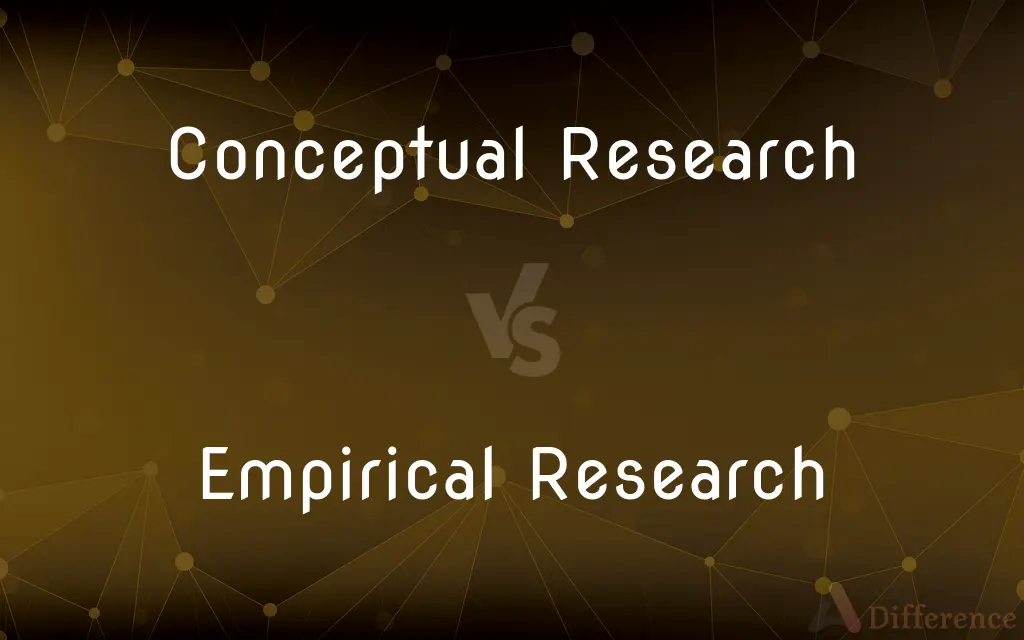Conceptual Research vs. Empirical Research — What's the Difference?
Edited by Tayyaba Rehman — By Fiza Rafique — Published on December 30, 2023
Conceptual Research is based on theoretical ideas without direct observation, while Empirical Research relies on direct observation or experimentation.

Difference Between Conceptual Research and Empirical Research
Table of Contents
ADVERTISEMENT
Key Differences
Conceptual Research revolves around abstract concepts and theories. It primarily relies on secondary sources like books, articles, and existing research. On the other hand, Empirical Research hinges on direct observations, measurements, or experiments to gather data.
The foundation of Conceptual Research lies in critical thinking, generating new ideas or expanding on existing ones. In contrast, Empirical Research involves the systematic collection and analysis of data, often seeking to prove or disprove a hypothesis.
Conceptual Research serves as a precursor to empirical studies by providing a theoretical framework. However, Empirical Research stands as the mechanism through which these theoretical constructs are tested in real-world or experimental settings.
In Conceptual Research, a scholar might analyze existing literature to form a new perspective or propose a new theory. In Empirical Research, that same scholar could conduct experiments or surveys to validate or challenge that theory.
Both Conceptual Research and Empirical Research contribute significantly to the knowledge base. The former provides theoretical understanding, and the latter offers practical evidence.
ADVERTISEMENT
Comparison Chart
Basis
Theoretical concepts without direct observation
Direct observation, experimentation, or measurement
Primary Sources
Books, articles, existing theories
Data from experiments, surveys, observations
Purpose
Develop new theories or expand on existing ones
Test hypotheses or theories in real-world settings
Reliance on
Critical thinking and secondary sources
Systematic collection and analysis of data
Contribution to Knowledge
Provides theoretical frameworks
Offers practical evidence to support or challenge theories
Compare with Definitions
Conceptual Research
An investigation based on secondary sources like literature reviews.
Through Conceptual Research, Lucy identified gaps in current marketing theories.
Empirical Research
Investigation that seeks to confirm or refute theories through evidence.
His Empirical Research challenged traditional beliefs about sleep patterns.
Conceptual Research
Research focusing on the examination and synthesis of existing knowledge.
Conceptual Research in psychology can lead to new therapeutic techniques based on theoretical understanding.
Empirical Research
Systematic research using observable and measurable evidence.
Through Empirical Research, the team discovered links between diet and cognitive function.
Conceptual Research
Research grounded in abstract ideas without relying on tangible observations.
Dr. Smith's Conceptual Research proposed a new theory about human motivation.
Empirical Research
Research based on direct observation or experimentation.
The scientist's Empirical Research showed that sunlight affected plant growth rates.
Conceptual Research
Analysis that derives understanding from theoretical constructs.
His Conceptual Research on cultural norms provided fresh perspectives on global communication.
Empirical Research
A study that relies on tangible data collected from the real world.
Empirical Research in economics often involves analyzing market trends using collected data.
Conceptual Research
A study that prioritizes the development or interpretation of ideas.
Conceptual Research often lays the groundwork for more targeted empirical studies.
Empirical Research
Research underpinned by data, often collected through experiments or surveys.
Empirical Research in sociology might involve surveys to understand societal behaviors.
Common Curiosities
What is Conceptual Research?
Conceptual Research deals with abstract ideas and theories, often without direct observation or experimentation.
Is Empirical Research more valid than Conceptual Research?
Not necessarily. Both have their value. Empirical provides practical evidence, while Conceptual offers theoretical insights.
Why is Conceptual Research important?
Conceptual Research offers new perspectives, theories, or highlights gaps in existing knowledge.
How does Empirical Research differ?
Empirical Research relies on direct observations, experiments, or measurements to gather data.
Can Empirical Research stand alone without Conceptual Research?
It can, but Conceptual Research often helps in providing a theoretical foundation for empirical studies.
Are hypotheses always tested in Empirical Research?
Often, but not always. Empirical Research may also be exploratory without a specific hypothesis.
Can one researcher do both Conceptual and Empirical Research?
Absolutely. Many researchers engage in both types throughout their careers.
Do all scientific studies use Empirical Research?
While many scientific studies are empirical, some might start with Conceptual Research for theoretical understanding.
Which research type is more common in academic journals?
Both are common. Conceptual articles might discuss theories, while empirical ones present data-driven findings.
Which research form is more challenging?
Both have their challenges: Conceptual in theoretical rigor and Empirical in experimental design and data analysis.
Can Conceptual Research lead to Empirical Research?
Yes, Conceptual Research can provide a theoretical framework that Empirical Research can later test.
How is data gathered in Empirical Research?
Data in Empirical Research is collected through observations, experiments, surveys, or measurements.
Which research type is quicker?
It varies. Conceptual might be quicker without data collection, but Empirical can be fast with a clear experimental setup.
Do the humanities prefer Conceptual Research?
While the humanities often engage in Conceptual Research, they also use Empirical Research, especially in interdisciplinary studies.
Is Conceptual or Empirical Research more impactful?
Both can be impactful in their own right, depending on their contribution to knowledge and the field of study.
Share Your Discovery

Previous Comparison
Buho vs. Lechuza
Next Comparison
Parakeets vs. LorikeetsAuthor Spotlight
Written by
Fiza RafiqueFiza Rafique is a skilled content writer at AskDifference.com, where she meticulously refines and enhances written pieces. Drawing from her vast editorial expertise, Fiza ensures clarity, accuracy, and precision in every article. Passionate about language, she continually seeks to elevate the quality of content for readers worldwide.
Edited by
Tayyaba RehmanTayyaba Rehman is a distinguished writer, currently serving as a primary contributor to askdifference.com. As a researcher in semantics and etymology, Tayyaba's passion for the complexity of languages and their distinctions has found a perfect home on the platform. Tayyaba delves into the intricacies of language, distinguishing between commonly confused words and phrases, thereby providing clarity for readers worldwide.











































